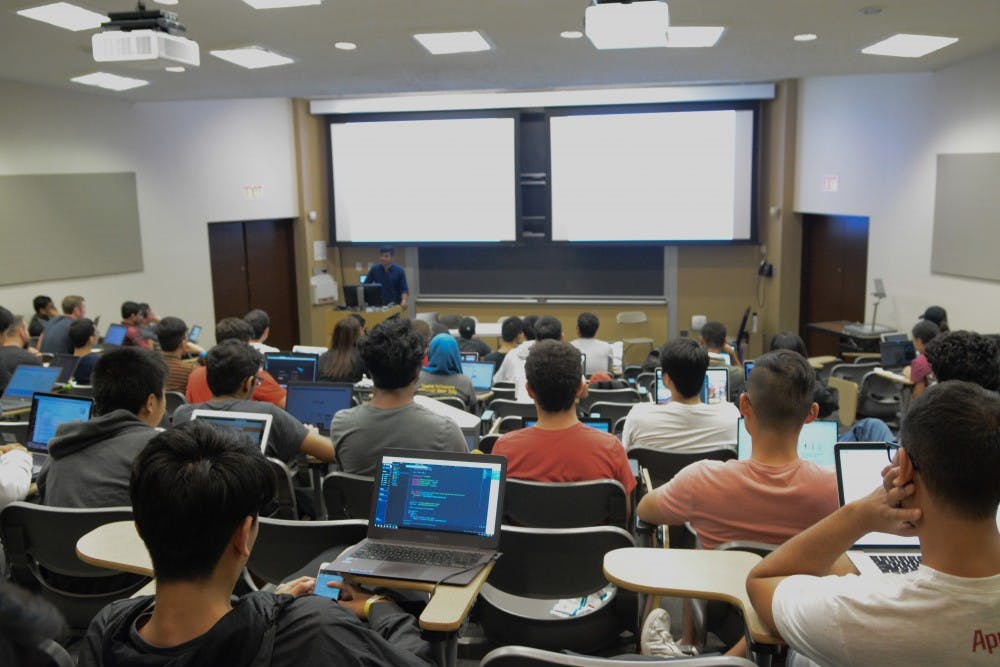The School of Engineering and Applied Science announced a new policy barring Penn students from being accepted into its sub-matriculation program if they spend more than eight semesters as an undergraduate — a significant barrier for the mass of engineers who spend an extra semester or year at Penn.
SEAS changed its sub-matriculation policy on Feb. 25, which previously allowed engineering students to enroll in the Accelerated Master’s Program. The program allows students to begin their master's program while still completing their undergraduate coursework, fast-tracking their graduate degree at Penn.
Now, undergraduate students who want to apply for a bachelor’s and master’s degree will need to complete all undergraduate coursework within eight semesters. The policy also blocks students pursuing uncoordinated dual degrees from being accepted into the program.
SEAS Director of Student Life and Undergraduate Education S. Sonya Gwak made the announcement Monday in an email to Engineering freshmen. The changes will only affect undergraduates entering Penn in fall 2018 or later.

Email from Director of Student Life and Undergraduate Education for SEAS, Sonya Gwak, about thew new Accelerated Master's program. (Photo from Joshua Nouriyelian)
Coordinated dual degree students under the Jerome Fisher Program in Management and Technology and Vagelos Integrated Program in Energy Research, however, have slightly more time to complete the undergraduate requirements. Instead of an eight semester limit, the students will have 10 semesters to complete their degrees.
If students cannot finish their undergraduate degree in eight semesters, their application to the accelerated master’s degree will be withdrawn. The earliest that students can apply is after two semesters.
Administrators say the policy change is meant to decrease students' coursework and stress. But engineering students have criticized the new policy as unreasonable and overly restrictive.
Boon Thau Loo, Associate Dean of the Master's and Professional Programs in the Engineering School, said the new policy is designed to make students think twice about their decision to apply for the Accelerated Master's Program. While the existing sub-matriculation program does not have a time limit, Loo said the new policy will ensure students are not stretching out their course load more than the typical eight semesters.
"There is something to be said about going deep in-depth and really learning something, than trying to cram a lot," Loo said." Even if you get good grades you might not know the material in a deep way."
Engineering junior Pranjal Goel said the shorter time limit will actually cause students to overload classes and become more stressed, especially because students can only double count up to three courses (except for four in biotechnology) for both their undergraduate and graduate requirements. The application also explicitly prohibits students from overloading courses.
“This is a restriction on gaining education,” Goel said.
Many seniors also choose to stay at Penn for an extra semester or year, said Engineering senior Victoria Huang, who will graduate with a masters and uncoordinated degree in cognitive science and computer science this year.
Even if Penn is concerned with the coursework that uncoordinated dual degree students face, some are able to handle the work, said Engineering junior Diana Marsala, who is currently in the school's sub-matriculation program.
“I enjoy what I am doing. I am not ultra-stressed all the time,” Marsala said. “I am able to handle it and I know what my limits are."
Marsala is also a first-year master’s student pursuing an uncoordinated dual degree in linguistics and computer science.
“If your rule is we don’t want people to overload on credits and we don’t want people to take seven credits or more a semester, okay, you can debate that separately,” Marsala said. “But blanket excluding uncoordinated dual degree students is just not right."
Loo said although the policy bans uncoordinated dual degree students from applying, Penn may consider applications from "rockstar" students who are able to handle the workload.
But Loo added that the school still does not encourage students to follow this path.
Engineering freshman Joshua Nouriyelian posted screenshots of the email announcement to CIS@Penn, Penn’s Computer and Information Science Facebook group, which was how upperclassmen were informed of the new policy.
Current freshmen and future undergraduates in CIS must have a 3.2 cumulative GPA and must submit an academic plan approved by the undergraduate chair to apply to the Accelerated Master's program, according to the new application form. The deadline to apply is the drop period in a student's seventh semester.
“As you go to the higher-level courses, the coursework actually gets easier and more manageable and lighter. It’s really the intro courses that are really heavy with a lot of work,” Huang said. “So I don’t see taking more classes as you go higher as a problem.”









